Thousands of housekeepers, bellhops, cooks, waiters, and other workers at more than a dozen hotels walked off the job in Southern California on July 2, in one of the largest hotel strikes in the nation’s history.
The work stoppage started after more than 60 hotels and Unite Here Local 11, the union representing more than 15,000 hotel workers in Los Angeles and Orange Counties, failed to agree on a new contract. The previous contract expired on Friday.
The union says employees from more hotels are likely to join the strike if an agreement isn’t reached soon.
Hotel employees are demanding improved benefits, a return to pre-pandemic staffing levels, and better wages at a time when inflation and housing costs are skyrocketing. They’re asking for an immediate $5 hourly raise, plus an extra $3 raise each year for the duration of the contract.
Currently, workers represented by the union make between $20 and $25 per hour.
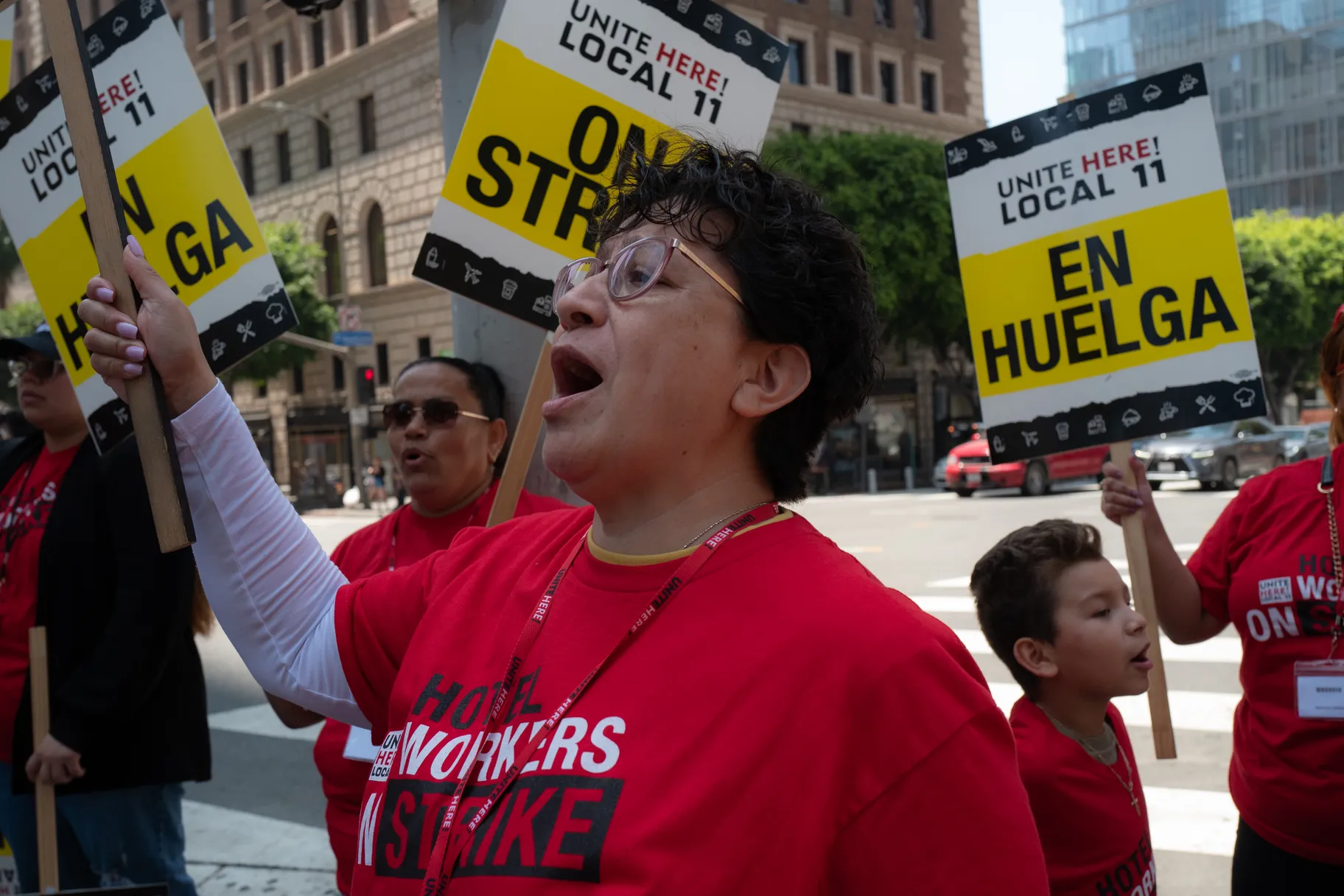
Osiris Gaona chants along with hotel workers and supporters outside the Intercontinental Hotel in Downtown Los Angeles, July 2, 2023. Photo by Zaydee Sanchez.
Osiris Gaona, a phone operator who was picketing at the InterContinental hotel in Downtown LA on Sunday, says that her current wages afford her only a one-bedroom apartment for herself, her husband, and three kids. Like many hotel workers, she says she’s had a tough time bouncing back from the pandemic.
“During the pandemic, we got a lot of cuts, and a lot of our co-workers went on furlough. I was furloughed myself,” says Gaona. “But yet, the hotels got help from the government. And now that we need the help, they're denying it to us. So we need support.”
So far, the hotels have offered a smaller hourly wage increase — an extra $2.50 the first year, followed by $6.25 spread out over the next four years.
Jackeline Reynoso, who commutes more than an hour each day from San Pedro to her kitchen job at the InterContinental, says the union’s demands are reasonable. She says workers plan to keep picketing until their demands are met.
“We are all here to fight for something because we want to get the benefits that we believe we deserve,” says Reynoso. “I don't think it's a selfish thought. … They're looking out for the company, but we're also looking out for our families. So I think it should be a mutual agreement.”
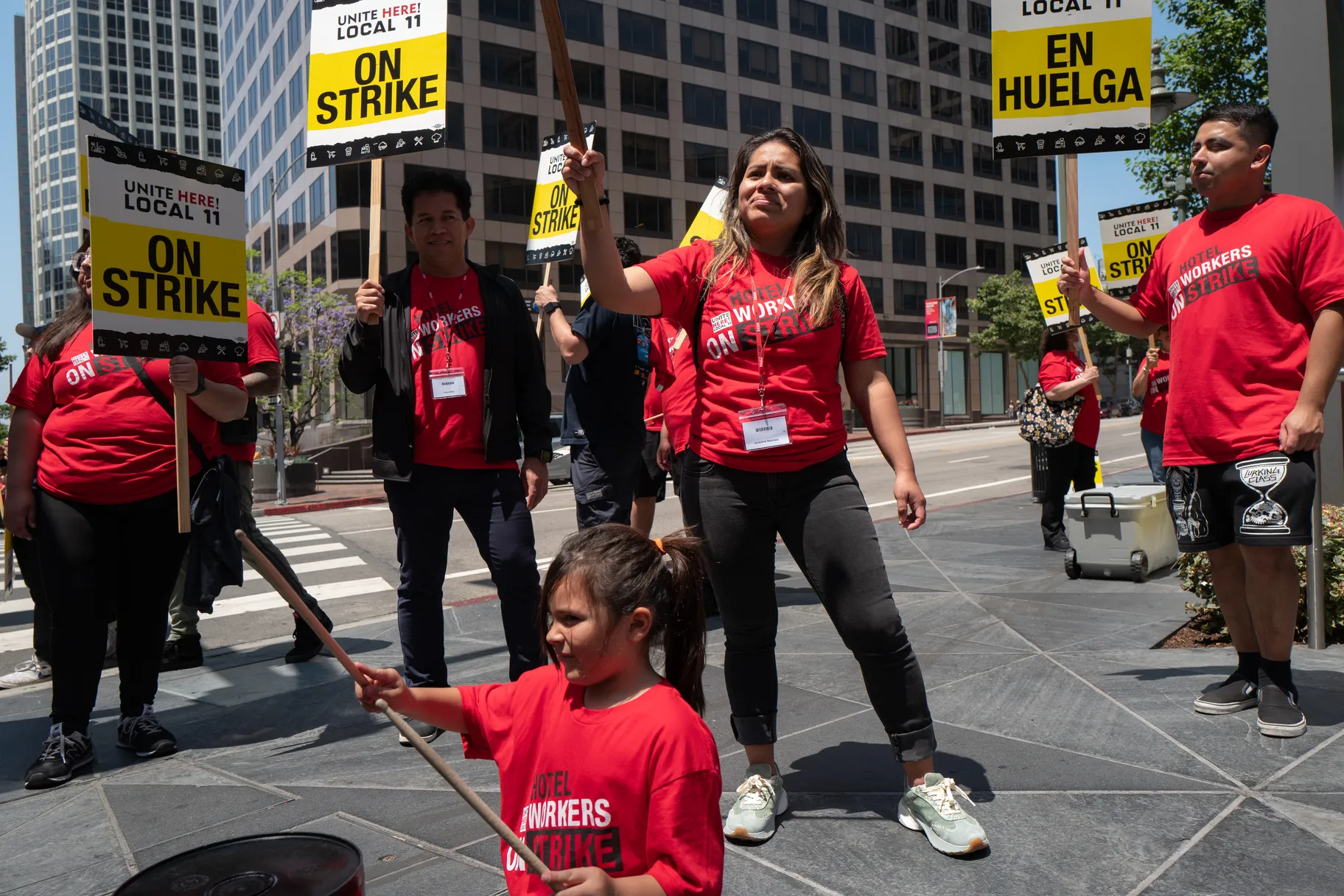
Jackeline Reynoso and her young daughter at the hotel strike in Los Angeles, July 2, 2023. Photo by Zaydee Sanchez.
The strike comes during what’s usually a busy Independence Day weekend. It also coincides with a large Anime Expo, which has drawn thousands of visitors to Downtown LA.
The expo is hosting some events in the JW Marriott Downtown LA, one the hotels where employees are on strike. The disruption there has spurred divisions within the anime community, with some attendees voicing support for the workers, while others are annoyed by the inconvenience.
Alan, a convention attendee who didn’t want to give his last name, said he’s doing his best to be understanding.
“It's been a lot of noise overnight, but that's not a big deal, especially in downtown,” he says. “I feel really badly if someone's been saving up for a couple of years and then this thing happens. … But I mean, the workers are gonna do what they're gonna do.”
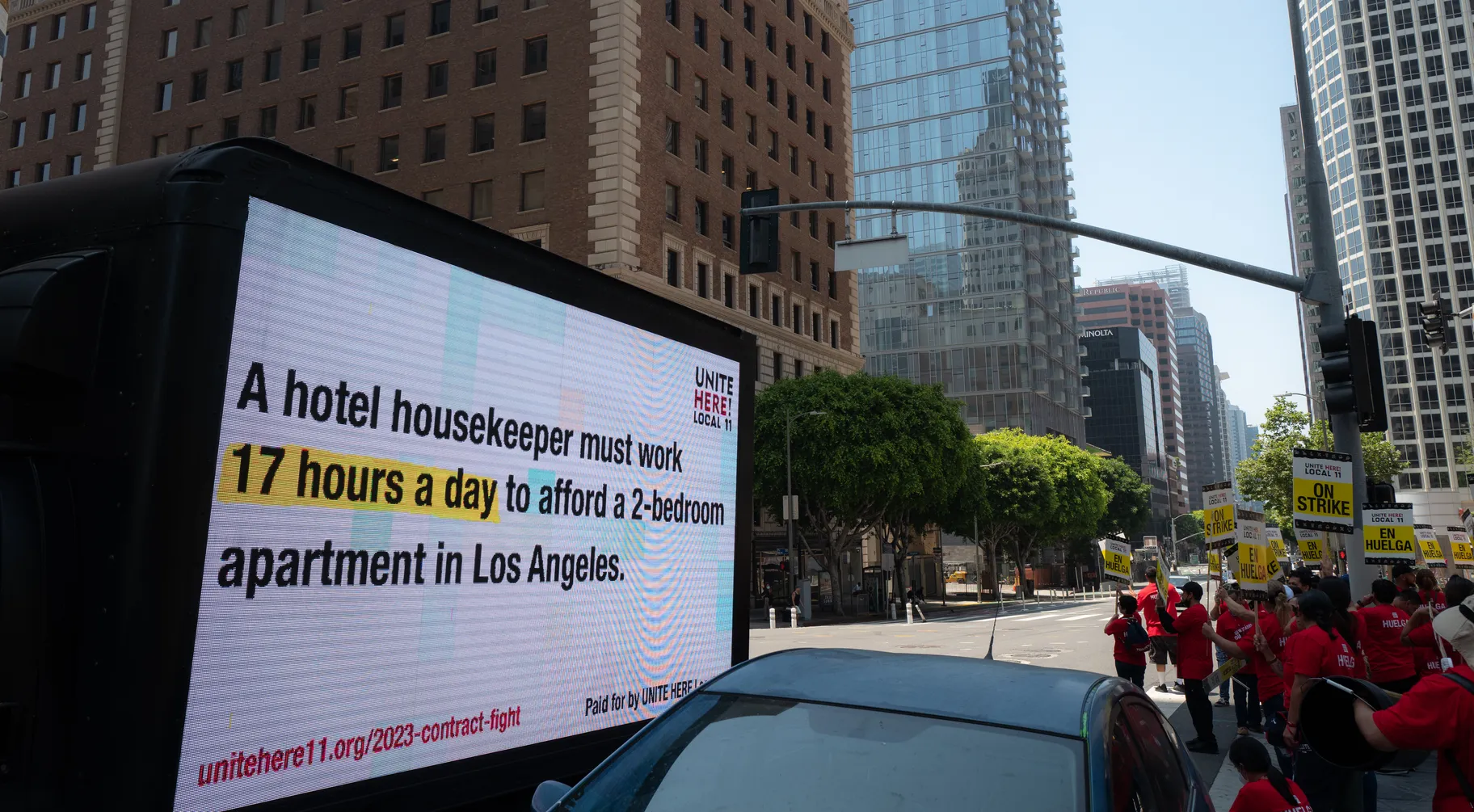
Hotel workers say they need better wages to manage inflation and skyrocketing housing costs. Photo by Zaydee Sanchez.
He says services at the striking Biltmore, where he is staying, have not stopped.
Peter Hillan, a spokesperson from the Hotel Association of Los Angeles, says most hotels anticipated the strike and had contingency plans in place — like bringing in workers from other locations.
“Most of our hotel owners are able to draw on the resources of other hotels to provide the services that our guests are anticipating, particularly over a long holiday weekend,” he says. “There may be some curtailment of the full services that they normally would have. But for the most part, we're able to provide, remain open and keep the guest experience good.”
But it’s unclear how long the hotels will be able to keep that up, especially if more workers at more hotels walk out.
A few hotels around the city are also being used as temporary shelters for people experiencing homelessness, including the LA Grand, whose staff walked out this morning. Employees there are responsible for providing food and cleaning services to residents, and it remains to be seen how the city will fill in the gaps.
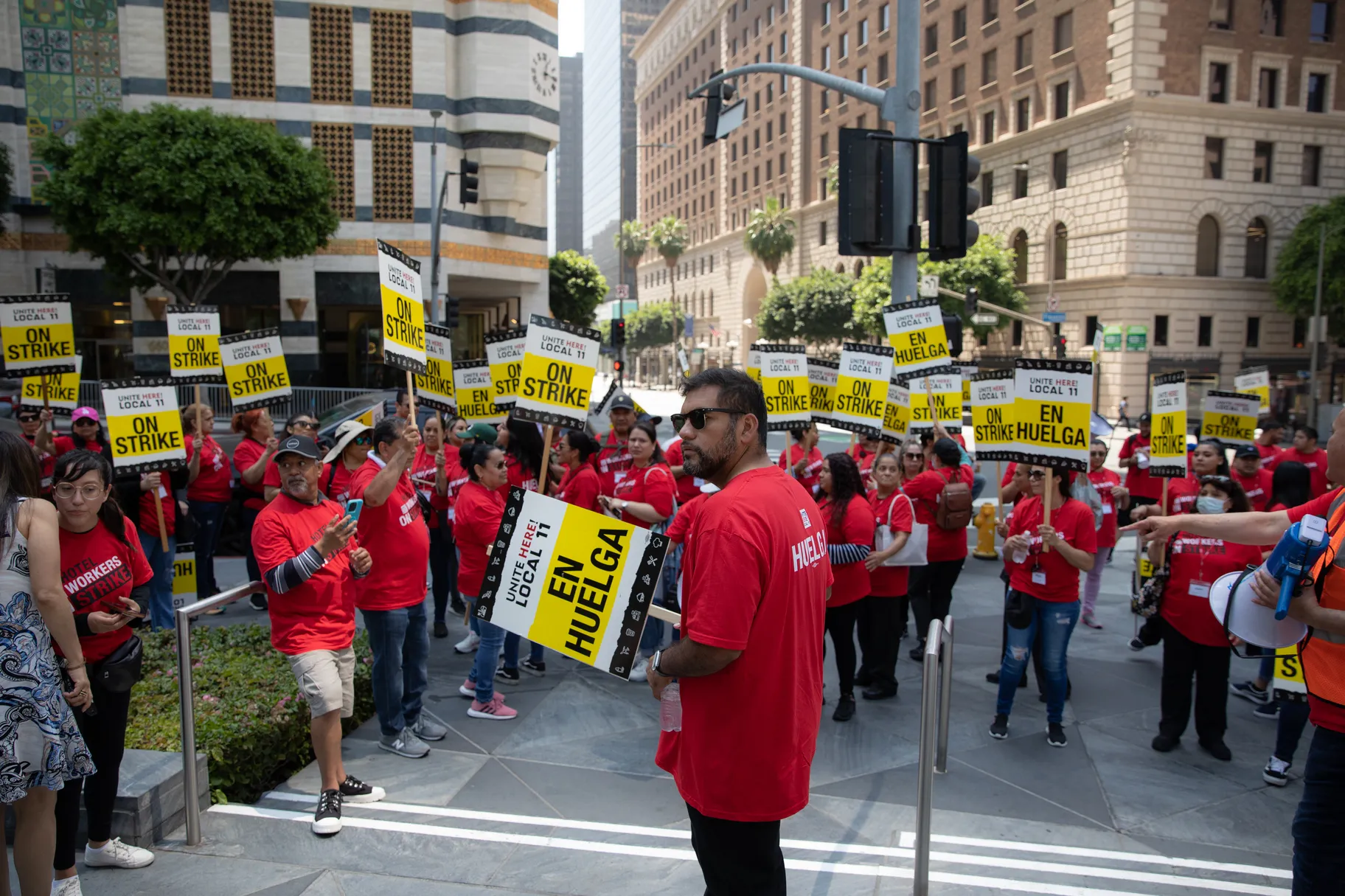
Councilmember Hugo-Soto Martinez joined striking workers in downtown Los Angeles, July 2, 2023. Photo by Zaydee Sanchez.
Kurt Peterson, co-president of Unite Here Local 11, declined to comment on the situation at the Grand, but says union members are fully supportive of hotels being used as temporary housing.
He points to another one of the union’s demands — a request that hotel owners publicly support a forthcoming ballot measure that would require empty hotel rooms to be used to shelter people who are unhoused.
“[The workers] just want to provide hospitality for these folks. There's no one more empathetic to people who are suffering on homelessness than our members, who are often a paycheck away,” he says. “The challenges are employers — they want to make money. The greed just drives them so that they won't keep the conditions safer, so they won't have sufficient staffing.”
The union is also pushing hotels to adopt an additional 7% tax on hotel guests to help pay for affordable workforce housing for hospitality employees.
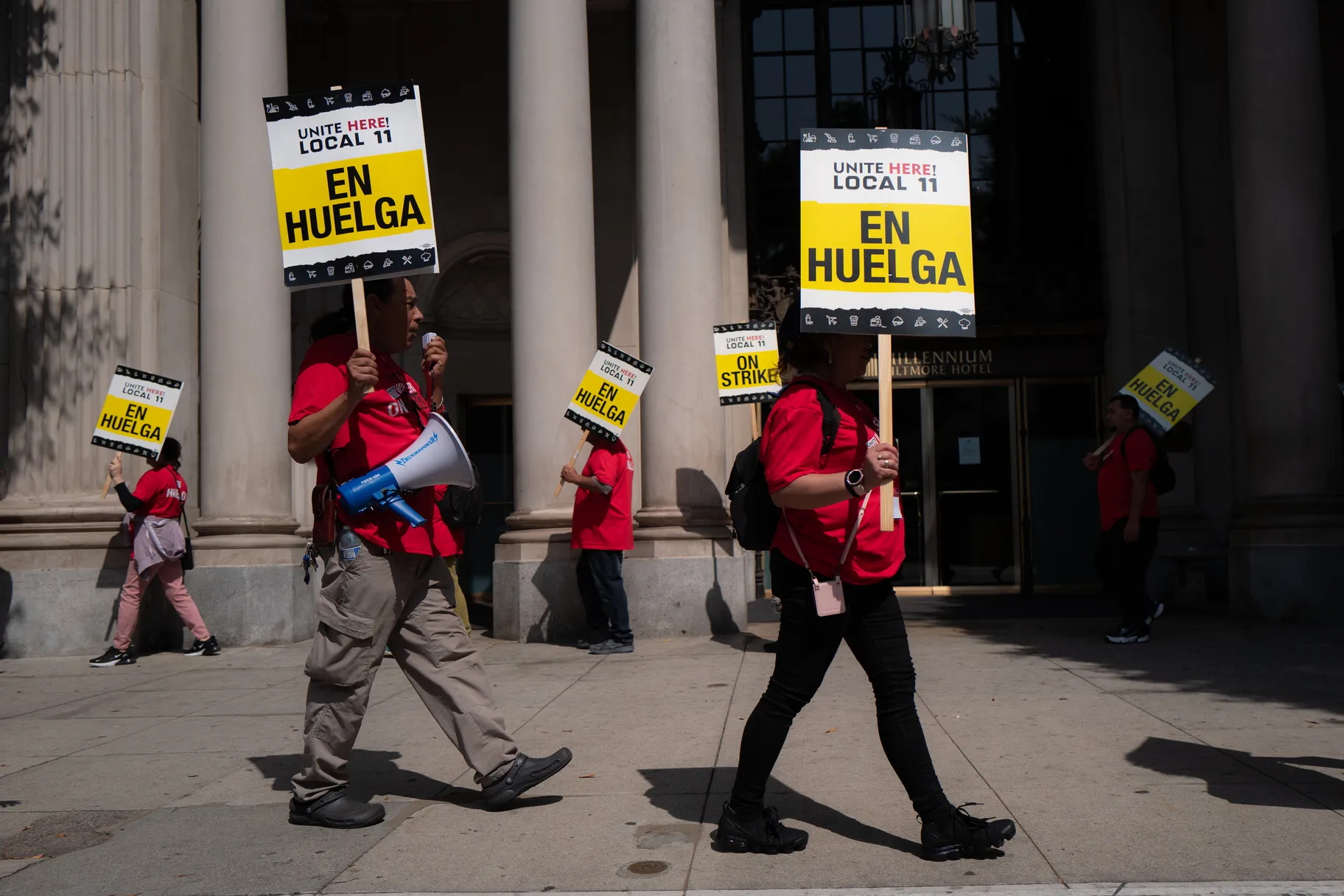
Southern California hotel workers rally outside the Biltmore Hotel in Downtown Los Angeles, July 2, 2023. Photo by Zaydee Sanchez.
In a statement, a group representing more than 40 bargaining hotels accused the union of using negotiations to further its political agenda and failing to bargain in good faith. They are urging the union to return to the table.
But Peterson says there’s little bargaining to be done right now. Workers at downtown’s Westin Bonaventure, the largest hotel represented by the union, already struck a deal with workers. Peterson says other hotels simply need to agree to the same terms.
“If [the Westin Bonaventure] can do it, so can everyone else. The hotels in Santa Monica, where their rates are quadruple, you're telling me they can't do this? Or in Beverly Hills? It's just absurd,” he says. “That's how bargaining works. They know it. We know it. When one hotel falls — a major hotel — that's what everyone else needs to do.”
Currently, there are no dates set for the two parties to return to the bargaining table.

